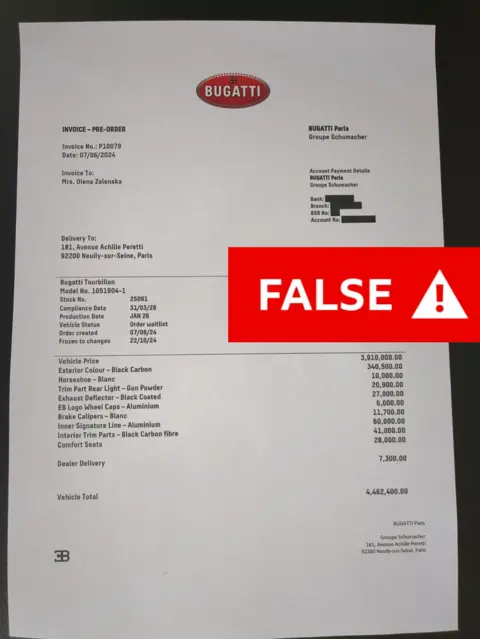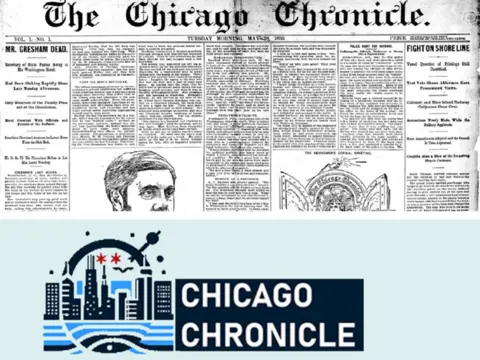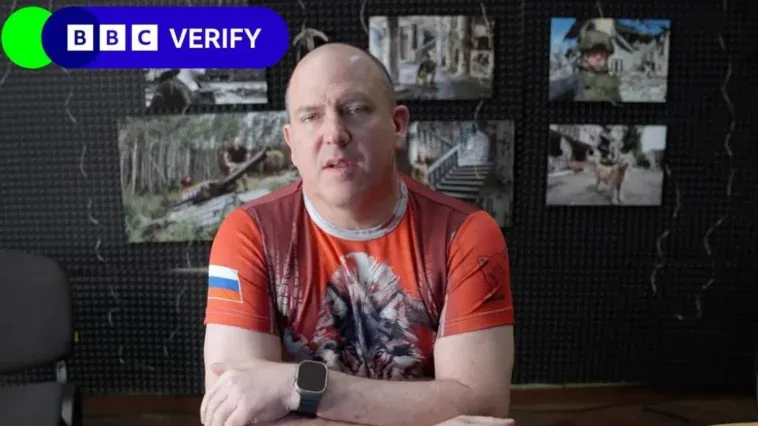(BBC) A network of Russia-based websites masquerading as local American newspapers is pumping out fake stories as part of an AI-powered operation that is increasingly targeting the US election, a BBC investigation can reveal.
A former Florida police officer who relocated to Moscow is one of the key figures behind it.
The following would have been a bombshell report – if it were true.
Olena Zelenska, the first lady of Ukraine, allegedly bought a rare Bugatti Tourbillon sports car for 4.5m euros ($4.8m; £3.8m) while visiting Paris for D-Day commemorations in June. The source of the funds was supposedly American military aid money.
The story appeared on an obscure French website just days ago – and was swiftly debunked.
Experts pointed out strange anomalies on the invoice posted online. A whistleblower cited in the story appeared only in an oddly edited video that may have been artificially created. Bugatti issued a sharp denial, calling it “fake news”, and its Paris dealership threatened legal action against the people behind the false story.
But before the truth could even get its shoes on, the lie had gone viral. Influencers had already picked up the false story and spread it widely.
One X user, the pro-Russia, pro-Donald Trump activist Jackson Hinkle, posted a link seen by more than 6.5m people. Several other accounts spread the story to millions more X users – at least 12m in total, according to the site’s metrics.
It was a fake story, on a fake news website, designed to spread widely online, with its origins in a Russia-based disinformation operation BBC Verify first revealed last year – at which point the operation appeared to be trying to undermine Ukraine’s government.

Our latest investigation, carried out over more than six months and involving the examination of hundreds of articles across dozens of websites, found that the operation has a new target – American voters.
Dozens of bogus stories tracked by the BBC appear aimed at influencing US voters and sowing distrust ahead of November’s election. Some have been roundly ignored but others have been shared by influencers and members of the US Congress.
The story of the Bugatti hit many of the top themes of the operation – Ukrainian corruption, US aid spending, and the inner workings of French high society.
Another fake which went viral earlier this year was more directly aimed at American politics.
It was published on a website called The Houston Post – one of dozens of sites with American-sounding names which are in reality run from Moscow – and alleged that the FBI illegally wiretapped Donald Trump’s Florida resort.
It played neatly into Trump’s allegations that the legal system is unfairly stacked against him, that there is a conspiracy to thwart his campaign, and that his opponents are using dirty tricks to undermine him. Mr Trump himself has accused the FBI of snooping on his conversations.
Experts say that the operation is just one part of a much larger ongoing effort, led from Moscow, to spread disinformation during the US election campaign.
While no hard evidence has emerged that these particular fake news websites are run by the Russian state, researchers say the scale and sophistication of the operation is broadly similar to previous Kremlin-backed efforts to spread disinformation in the West.
“Russia will be involved in the US 2024 election, as will others,” said Chris Krebs, who as the director of the US Cybersecurity and Infrastructure Security Agency was responsible for ensuring the integrity of the 2020 presidential election.
“We’re already seeing them – from a broader information operations perspective on social media and elsewhere – enter the fray, pushing against already contentious points in US politics,” he said.
The BBC contacted the Russian Foreign Ministry and Russia’s US and UK embassies, but received no response. We also attempted to contact Mr Hinkle for comment.
How the fakes spread
 Chicago Chronicle
Chicago Chronicle





